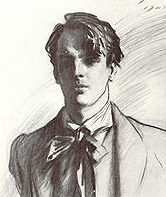
Solomon And The Witch
by William Butler Yeats
And thus declared that Arab lady: "Last night, where under the wild moon On grassy mattress I had laid me, Within my arms great Solomon, I suddenly cried out in a strange tongue Not his, not mine." Who understood Whatever has been said, sighed, sung, Howled, miau-d, barked, brayed, belled, yelled, cried, crowed, Thereon replied: "A cockerel Crew from a blossoming apple bough Three hundred years before the Fall, And never crew again till now, And would not now but that he thought, Chance being at one with Choice at last, All that the brigand apple brought And this foul world were dead at last. He that crowed out eternity Thought to have crowed it in again. For though love has a spider's eye To find out some appropriate pain -- Aye, though all passion's in the glance -- For every nerve, and tests a lover With cruelties of Choice and Chance; And when at last that murder's over Maybe the bride-bed brings despair, For each an imagined image brings And finds a real image there; Yet the world ends when these two things, Though several, are a single light, When oil and wick are burned in one; Therefore a blessed moon last night Gave Sheba to her Solomon.' "Yet the world stays.' "If that be so, Your cockerel found us in the wrong Although he thought it. worth a crow. Maybe an image is too strong Or maybe is not strong enough.' "The night has fallen; not a sound In the forbidden sacred grove Unless a petal hit the ground, Nor any human sight within it But the crushed grass where we have lain! And the moon is wilder every minute. O! Solomon! let us try again.'
0
Create a library and add your favorite stories. Get started by clicking the "Add" button.
Add Solomon And The Witch to your own personal library.
Add Solomon And The Witch to your own personal library.
Return to the William Butler Yeats Home Page, or . . . Read the next poem; Solomon To Sheba









